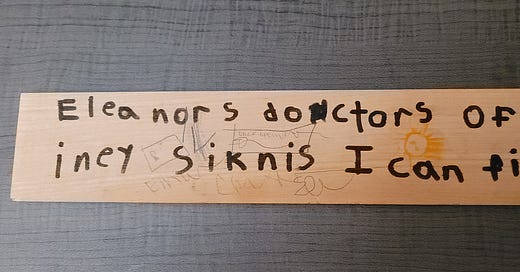“Papa, do you have a piece of wood I can write on?”
“Wood? You’re going to write on wood?” I said.
“If you have a Sharpie,” she replied.
Grandfathers exist to serve whether or not they understand; I am reminded of this truism often.
“What kind of wood?” I asked. She looked at the few pieces I had for kindling and settled on a flat strip of pine that looked like an overlarge tongue depressor. An eighth of an inch thick, maybe. About 2.5 x12.
She uncapped the Sharpie and went to work. Next thing I know, she’s propping her shingle on the sideboard in my TV room:
She then drafted me to be her first patient.
Over the next few babysitting gigs I regularly found myself on her examination table (the couch next to the sideboard), describing whatever “symptoms” I could think of that might give rise to a diagnosis of stomach ache, a sore knee, an earache, a (real) broken toe, an old and twice repaired navel hernia.
And each time, no matter the ailment—as predictably as Theodoric, Barber of York ordered “a bloodletting, boar’s vomit and a few leaches”—Dr. Eleanor settled on the same exact prescription: surgery: “I’ll have to operate,” she would say grimly.
If ever I questioned that strategy—don’t you think we might try some some ear drops first? Maybe schedule some PT?—kind of like Theodoric, she would say, in effect, “Hey! Who’s the doctor here?”
Hilarious.
But in point of fact, Eleanor is only one of several “family physicians” I know, none of whom are doctors at all, of course, but that does not mute their absolute certainty about “iney siknis” I might have. Or the conviction that they can “fis” it.
Eleanor gets a pass. She’s 7.
The rest are hereby charged with bloviationism.
+
For a couple of weeks now I have been writing about what I have called bloviationism—but what is more formally described as the Dunning-Kruger Effect.
The skinny: when people speak with absolute certainty about...whatever’s the matter at hand...but without very much knowledge of, training in or experience with...whatever’s the matter at hand… that is bloviationism. One who bloviates is, of course, a blowhard.
A corollary to the actual Dunning-Kruger Effect is that the less a blowhard knows, the greater their certainty. Unsurprisingly, bloviators resist or dismiss information that challenges or could correct their ignorance. “Double-down” is the working strategy (and evidence) of the Dunning-Kruger Effect in real time.
I have noted that in our precincts, “Religion” and “Politics” are obvious hothouses for Dunning-Kruger—not only because both domains boast treasure-troves of fragmentary, easily misinterpreted information, but also because each domain is rife with its own set of suspicions (and distrust) of “so-called experts,” or “ivory-tower authorities.”
Such wariness is deep in the cultural DNA of a people whose identity is based on both the rejection of historic institutions, and a corresponding (often uncritical and sometimes militant) confidence in individual competency.
+
There, is, of course, a third field of endeavor where Dunning-Kruger (and bloviationism) is always white unto harvest: medicine.
I am thinking not just about anti-vaxxers, anti-maskers, Fauci-haters and COVID-deniers—though each of those matters are reviewable instances of the Dunning-Kruger Effect.
But today I am thinking more about those who without so much as the benefit of a old PDR presume to diagnose and describe your condition to you, and even to prescribe exactly what you need to do—what you need to eat or drink or take (and not more chemicals!) in order to heal.
Their diagnosis will likely be based on something they had, once, or something someone told them. Similarly, their “prescription” will most like comprise a cauldron full of over-the-counter powders or an infomercial blend of organic herbs “that the medical establishment does not want you to know about!” And, of course, Metamucil.
And I am thinking about the folk I know who discounted the good (and disciplined) opinions of actual health-care professionals in favor of unorthodox and untested treatments.
I want to say I can almost understand that move—away from the hospital and to the sweat lodge or whatever—because like poor Alice I recently took a tumble through a rabbit hole and found myself behind the Looking Glass, as it were. I landed not in Wonderland but in Horrorland (https://tomsteagald.substack.com/p/welcome-to-the-hospital-transylvania), which was populated by a cast of characters stranger than anything Lewis Carroll ever imagined.
My “favorite” was a stethoscoped Queen of Hearts who seemed ready to take my head. The too-earnest King may have been on the spectrum.
And still I give lab coats the nod, weird as some of those wearing them can be. Which is to say I have less and less patience with “medical” bloviators.
Now, I have no illusions: which is to say, the Enlightenment, elitism, and Marvel Comics have failed to convince me that physicians are superheroes who carry instantaneous curing in their utility belts and Rx pads.
What was it Erma Bombeck used to say? That “50% of all doctors finished in the lower half of their class?”
I also understand that medicinal “miracles,” if they rise to such a standard, are as incremental as they can be incomplete. And that disaster is an ever-present possibility even with strict protocols (nor is plastic surgery the only evidence).
Even so… count me among those who know how little I know and and how much I need peer-reviewed, board certified others to understand what I certainly do not…and to prescribe lab-tested stuff, in order to cure, as best they can, what ails me.
And yes, I fully expect my granddaughter to be one of them.







